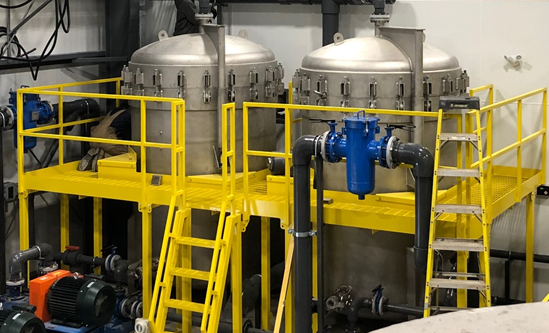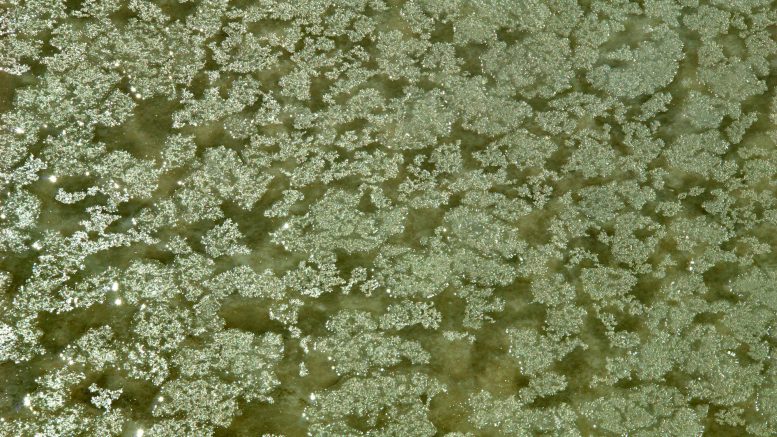Volt Lithium (TSXV: VLT) shares jumped by almost 20% Wednesday morning after it announced lithium recoveries of 90% and at relatively low costs from testing at its Rainbow Lake lithium property in northwestern Alberta.
The pilot project, using Volt’s proprietary direct lithium extraction (DLE) technology achieved 90% lithium recoveries at concentrations as low as 34 mg per litre, the company said in a release on Wednesday. It also simulated operating conditions at concentrations of 120 mg per litre and recovered up to 97% lithium. Assuming average annual production of 20,000 tonnes of lithium hydroxide monohydrate, operating costs would be under $4,000 per tonne.
In the next week, Volt aims to process brines with concentrations of 120 mg per litre to validate the simulated results of the pilot project.

The equipment utilized by Volt to treat its brine prior to entering into the direct lithium extraction process. Credit: Volt Lithium
The results come as the Vancouver-based lithium developer looks to finish a preliminary economic assessment for Rainbow Lake by the end of the summer.
“It’s been a technological breakthrough,” said Volt president and CEO Alex Wylie, in a webinar on Wednesday. “We’ve proved the technology side and we’ve shown we can do it economically. We’re able to…open up any major oil field across North America that has lithium in it.”
Volt started the project in March, which was designed to simulate a commercial operating environment and allow the company to confirm economic recoveries of the battery mineral from oil field brines.
Volt noted that the recovery concentrations of up to 120 mg lithium per litre are equivalent to concentrations found in the Muskeg aquifer at Rainbow Lake. A technical report published on Thursday stated the property hosts an inferred resource of 4.3 million tonnes of lithium carbonate equivalent in the Sulphur Point, Muskeg and Key River aquifers. In total, the property contains about 15.7 billion cubic metres of brine, with lithium concentrations as high as 121 mg per litre, with an average associated lithium concentration of 51 mg per litre.
Wylie said the company aims to start commercial production by the second half of 2024, with output of 1,000 tonnes per year of lithium in the first stage and up to 7,500 tonnes per year in the second.
Wylie said Volt could reach 20,000 tonnes per year by 2026 or 2027.
“It’s not just Rainbow Lake,” he said. “I’d like to plant my flag on a number of fields as we start the business.”
The company’s DLE technology extracts lithium from oilfield brine in a two-stage process. In the first stage, the brine is treated to remove contaminants, and in the second, Volt’s IES-300 technology extracts the lithium which is concentrated down to a lithium chloride solution. That solution is eventually upgraded to lithium hydroxide monohydrate, a raw material needed for electric vehicle batteries.
Its operating costs in the pilot translate to recoveries of $3,944 per tonne at concentrations of 120 mg per litre, $5,951 per tonne at 75 mg per litre and $8,627 at 50 mg per litre.
Wylie said its pilot and Rainbow Lake fit into a larger “North American solution” to lithium prices.
“The [lithium] market is really controlled a lot out of China. As we bring on North American production it’ll change the price because there’ll be a lot of demand. At US$40,000 to US$50,000 per tonne I think it’s a big opportunity for brine companies.”
Volt is looking to establish a permanent pilot plant to continue refining the IES-300 technology and improving operating conditions to keep reducing operating costs.
Volt shares rose by 19% on Wednesday morning, spiking to 55¢ and setting a new 52-week high, before settling to 46¢ at mid-day. Its yearly low was 6¢. The company has a market capitalization of $48.7 million.


Be the first to comment on "Volt Lithium stock leaps as company claims breakthrough on oil brine recoveries"